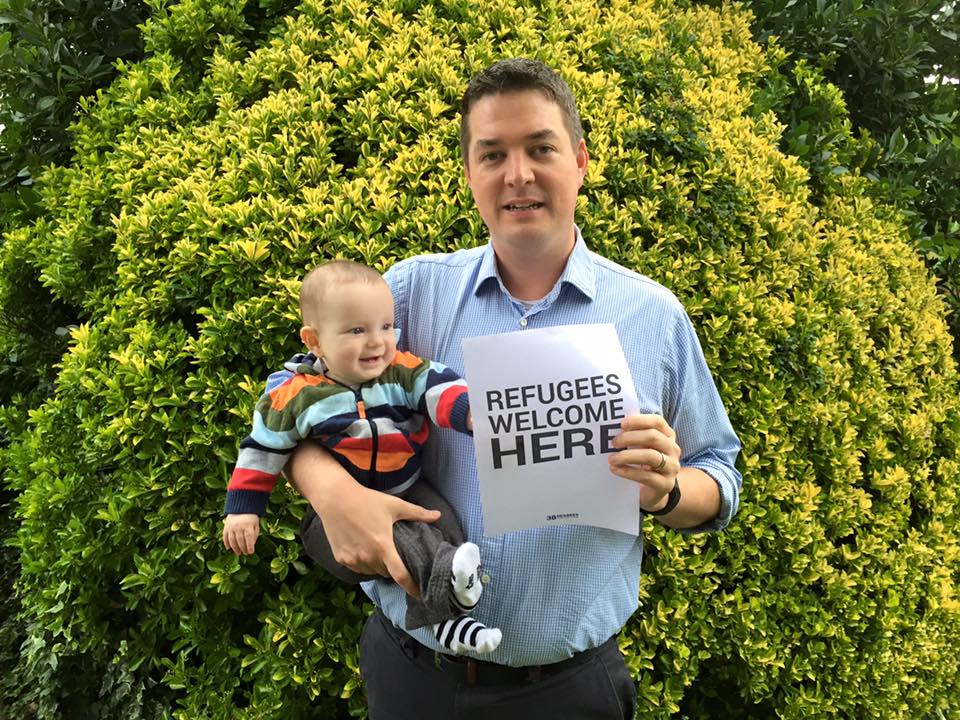From winning a historic commitment to enshrine 0.7% on overseas aid into law, to being part of a global movement that mobilised 31 million people, to seeing friends celebrate success at the climate negotiations in Paris. 2015 has been a busy but brilliant year for me and my team at Bond.
Personally it’s also been a year of change, I became a father for the first time (proud father picture above), stepped back from being involved in the Labour Party at a time membership in the party surged (if you’ve just joined read my advice here) and tried to blog at least once a fortnight!
As we head toward the Christmas and the end of 2015, I’ve been reflecting on the lessons that I’ve learnt from the work I’ve done over the last 12 months.
1 – Winning is great – Development campaigning can sometime feel like change is secured by the inclusion of a paragraph here or a commitment announced there – all important but . So being part of the winning Turn Up Save Lives campaign was an awesome feeling and a moment to celebrate. Fast forward 9 months and I had the opposite feeling when despite mobilising hundreds of local residents to welcome refugees to Wandsworth the council rejected the plan. The ecstasy of winning and the agony of losing are the best fuel for campaigning.
2 – We need to say thank you – to our supporters, to our activists and to politicians when they deliver what we’ve called on them to do. To those you work alongside in your movement.
3 – It’s vital to get outside the bubble – One of the most enjoyable things I’ve done this year is take 5 days to drive a VW Camper Van around the country talking to people in city centers about the Global Goals. It was a good reminder that our issues aren’t front and center of people’s minds. Its something that I’ve experienced on the doorstep as well – most of the public aren’t interested in our issues. We all need to get out and about talking to Joe Public on the High Streets and Cul-de-Sacs of the UK
4 – Be movement generous – When I started the year explaining to people that the action/2015 campaign would be based on a ‘flotilla’ approach many weren’t convinced. The idea was we would agree on broad objectives and coordinate loosely around tactics but allow organisations to keep their own brand and not create a strong coordination structure. But the approach has worked remarkably well. The formal evaluation will capture all of the secrets of its success, but for me one of the key elements has been the commitment to movement generosity among those involved. It’s not always easy, but one of my keys to successful coalitions.
5 – Persistence pays off – Turn Up Save Lives was a campaign that had its roots in mass lobbies of Parliament in the 1980. The decision by Obama to reject the Keystone XL pipeline was a victory for a 5+ year campaign. It’s easy to get caught in 12 month planning cycles for our campaigns, but both are reminders that change can often take a lot longer.
6 – Elections change everything – Sure, perhaps none of us saw the result we got but the outcome of the UK General Election has changed the political dynamics dramatically (my initial thoughts here). I’ve spent my whole campaigning career under a Labour or Coalition government, and there aren’t many people around who ran campaigns under the Major government in 1996. Adjusting to the new political landscape is critical, for example the one individual I wished I’d spent more time campaigning towards over the last 5 years – George Osborne. The Comprehensive Spending Review in November showed he’s the one making many of the key political decisions in the current government.
7 – Spending time learning from disruptors – some of the most successful campaigns this year haven’t had a single NGO involved in them. Remember the milk price protests across the summer, or seen how Uber have pushed to get TfL to change the regulations of taxis in London. Both successful examples of using campaigning tactics to deliver change – and that’s before you look at the wins that change.org has delivered.
8 – Time to think about new approaches – the calendar has been packed with ‘moments’ this year – from UN Summit, to Election, to Climate Negotiations but is it time to move away from ‘moment’ focused campaign that we’ve grown comfortable with. The same goes for our tactics. I’ve spent lots of time reflecting on if we need to move away from petitions and do more to invest in our grassroots networks of activists. More to think about in 2016.
9 – Take M&E seriously – M&E isn’t often described as motivating and exciting, but as this excellent report from my colleagues at Bond suggests we need to be putting them into the public domain where they could more easily be used to improve the international development programmes of the future. It’s time as campaigners to do the same, to take M&E seriously (here are some thoughts on how to do that) and start sharing our evaluations.
10 – Take a break – I’ve been terrible at taking my own advice from the start of year. Time to start thinking about 2016 resolutions!
Finally, on a personal note, it’s been a record breaking year on the blog. Thank you to everyone who has commented, tweeted posts, signed up for email updates or just take the time to say they enjoy the blog. They’re all hugely motivating to keep going. I’m looking forward to 2016 where I’ll aim to continue to bring you regular posts on what’s happening in the world of campaigning.
My campaign lessons from 2015
